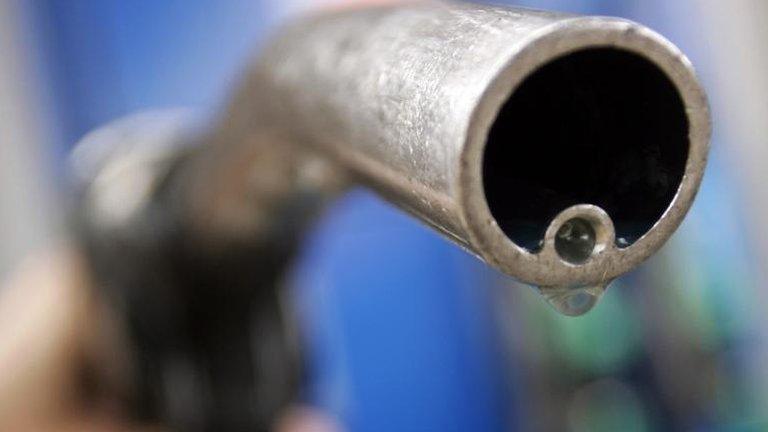BP announces North Sea job cuts
- Published
Chancellor George Osborne: "With the Budget approaching, we're going to look at what more can be done to support investment... in the North Sea"
The oil giant BP has announced it is to cut 200 jobs and 100 contractor roles in the North Sea following a review of its operations.
Staff at the company's North Sea headquarters in Aberdeen have been briefed about the plans.
It follows similar announcements by companies including ConocoPhillips, Chevron and Shell in recent months.
The Chancellor has said he will look at new measures to support the industry in his next budget in March.
BP currently employs 3,500 people in the North Sea, with a further 11,000 elsewhere in the UK.
George Osborne "needs to look at the tax incentives for investment" - Ed Balls, shadow Chancellor
The oil giant announced a major restructuring in December in response to the fall in the world oil price, which has halved in recent months.
BP said it needed to respond to "toughening market conditions". The company has been downsizing since the Deepwater Horizon oil spill in the Gulf of Mexico in 2010.
The recent oil price reduction "has simply made this even more imperative", it said.
North Sea taskforce
UK Energy Secretary Ed Davey later announced that a taskforce would be set up to help the sector cope with falling prices.
After talks with industry leaders in Aberdeen, he said he had appointed the first chief executive of the new oil and gas regulator, Andy Samuel, to head the taskforce and report his findings by the end of next month.
Mr Davey, speaking to Radio 5Live, said: "I have asked Andy Samuel, the chief executive of the new Oil and Gas Authority, to do an urgent commission to look at how the strategic work that he is doing needs to be fast tracked so we can deal with some of the issues resulting from the oil price reduction."
Mr Davey also hinted that some tax breaks for the sector could be included in George Osborne's Budget in March and that further reforms were under consideration.
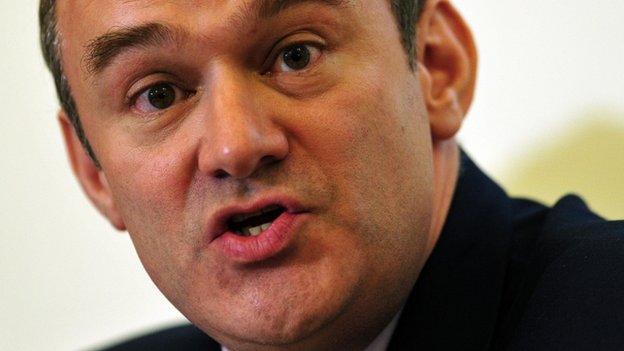
UK Energy Secretary Ed Davey said a new taskforce would report next month
Scotland's first minister, Nicola Sturgeon, has meanwhile written to the prime minister, David Cameron, to demand cuts in North Sea oil production taxes and new incentives for exploration before the UK budget.
Ms Sturgeon said "urgent action" was required to support the industry through a period of low oil prices.
The Scottish government has called for the supplementary charge on the oil and gas industry introduced by the UK government in 2011 to be scrapped.
That position is backed by Oil and Gas UK, which has argued that further tax cuts would help the sector deal with falling oil prices.
The Scottish Labour leader, Jim Murphy, has asked Mr Cameron to meet a delegation from Aberdeen next week to discuss changes to the tax regime.
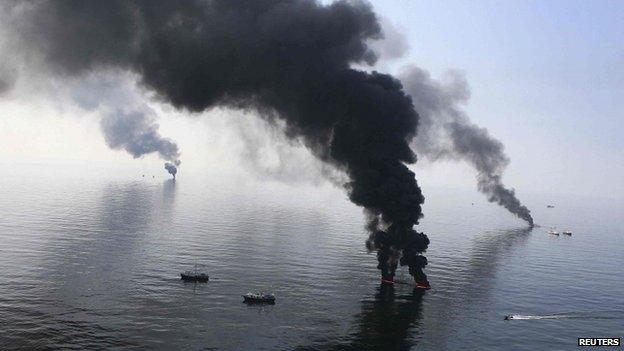
BP has been downsizing since the Deepwater Horizon oil spill in 2010
Trevor Garlick, regional president for BP North Sea, said the company was committed to the North Sea and saw a long-term future for its business there.
But he added: "However, given the well-documented challenges of operating in this maturing region and in toughening market conditions, we are taking specific steps to ensure our business remains competitive and robust, and we are aligning with the wider industry.
"Whilst our primary focus will be on improving efficiencies and on simplifying the way we work, an inevitable outcome of this will be an impact on headcount and we expect a reduction of around 200 staff and 100 contractor roles.
"We have spoken to staff and will work with those affected over the coming months."
Last month, BP announced that plans to cut hundreds of jobs within its back-office departments - many of them based in the UK and US - would be accelerated. The restructuring is expected to cost £640m in the coming years.
BP is the latest in a string of North Sea operators to announce job losses, with ConocoPhillips announcing last month it was cutting 230 jobs, while Shell cut 250 jobs last August, and Chevron lost 225 in July.
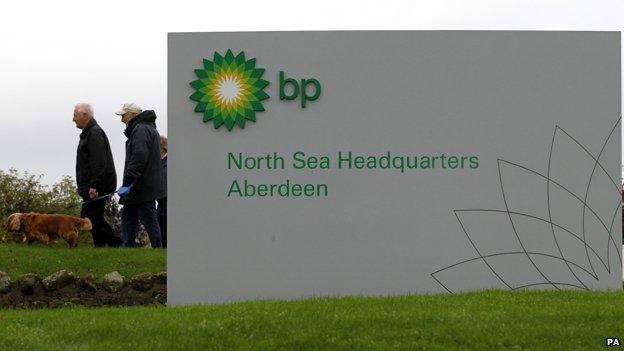
Some, including the Wood Group and Chevron, have announced salary freezes for staff and pay cuts for contractors.
The price of a barrel of oil dropped to a low of about $46 earlier this week from a peak of about $115 last summer.
Oil prices hit record highs above $147 a barrel in July 2008, external - but as the global economic crisis began to bite, they plummeted to around $30 in December of the same year before rising sharply again.
Even before oil prices started to fall, the industry had said it needed to address high costs, which included the number of contractors on large, often six-figure sums.
Mick Cash, general secretary of the Rail, Maritime and Transport (RMT) union, said BP's announcement was a "devastating blow" to workers and said he had been warned there was "much worse to come".
He added: "RMT believes that the industry is making offshore workers carry the can for their failure to plan for lean times such as these.
"Instead they have gone for a short-term slash-and-burn approach that will have long-term implications for the future of the entire industry and the security of the UK's energy supplies."
He said the unions would be pushing for a halt to the job cuts programme and an emergency package of measures to stave off the "destruction of both jobs and infrastructure" when they meet with industry body Oil annd Gas UK on Friday.
"We are also continuing to lobby politicians for incentives to allow exploration, maintenance, safety and engineering development works to take place during this emergency period for the industry," he added.
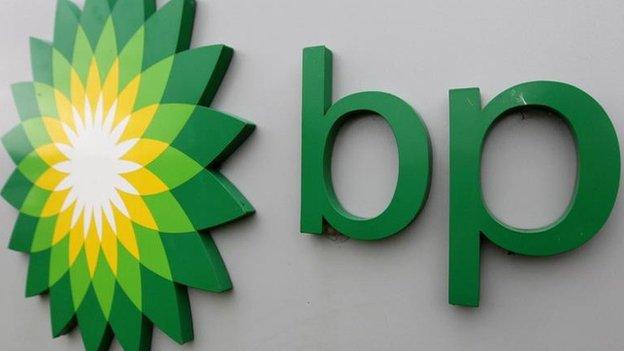
BP and the North Sea
BP employs 3,500 staff in the North Sea out of a total of 15,000 across the UK and 84,000 across the world.
To date it has invested £35bn in the North Sea, and produced five billion barrels of oil and gas.
North Sea operations account for 5% of the company's global production.
It has 45 production fields, 33 platforms and 10 pipeline systems in the UK continental shelf.
BP estimates it is sitting on three billion barrels of oil equivalent reserves in the North Sea.
The Clair field, west of Shetland, is BP's flagship future development and the largest oilfield in Europe, containing an estimated eight billion barrels of oil.
The company also owns the Forties Pipeline System, described as the single most important piece of oil and gas infrastructure in the UK.

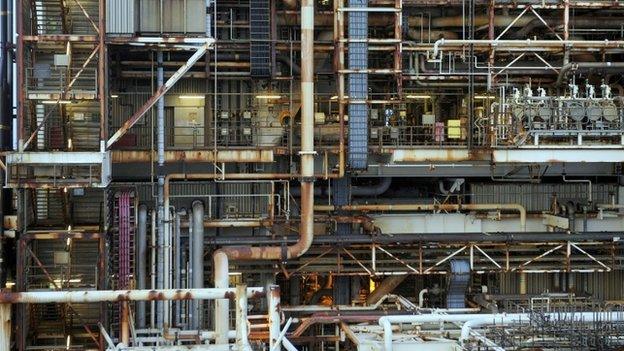
Douglas Fraser
BBC Scotland business and economy editor
This is an industry where suppliers and individual freelance contracts benefit from rapid price inflation in the boom times, but suffer sharp cost cuts in the bad times.
That's why Wood Group, among others, simply lopped 10% off its contractor payments last month.
Of course, that feeds through to the spending power of those workers, who could be found living and spending big money across Scotland and beyond. They're important to some remote communities as much as the oil and gas heartlands of Aberdeen city and shire.
What, then, of this broader economic impact?
There's a lot of analysis coming in these days. Wood Mackenzie, the energy analyst and consultancy based in Edinburgh, has been rather busy.

Data released on Thursday showed that the number of oil wells drilled in the UK sector of the North Sea fell to the lowest level in 15 years last year, which analysts said underlined the basin's struggle with high exploration costs that have contributed to a decline in output.
Oil and gas explorers drilled just 40 exploration and appraisal wells in the UK Continental Shelf (UKCS) in 2014, 47% lower than the average yearly drills over the past 10 years, according to the data from Deloitte's Petroleum Services Group, external.
Many large oil companies have cut investments in the North Sea as they see more profitable new fields in emerging areas such as south-east Asia and Brazil.
North Sea producer Premier Oil said on Wednesday it was not committing to new exploration work beyond a portfolio of eight key projects, none of which is in the UK.
But Total has confirmed that gas and condensate production has started at its West Franklin Phase 2 project in the Central Graben area, some 150 miles (240km) east of Aberdeen.
It will develop reserves equivalent to 85 million barrels of oil. The project includes the drilling of three new production wells and the installation of two new platforms.

And US-based asset management firm the Carlyle Group has announced plans for £660m of investments in the UK oil and gas sector.
Its intention to commit the equity capital in the North Sea is one of a series of transatlantic trade announcements marking a visit by Prime Minister David Cameron to US President Barack Obama.
Bank of England governor Mark Carney told a House of Commons committee on Wednesday that plunging oil prices represented a "negative shock" to the Scottish economy, which is heavily reliant on North Sea reserves.
But Mr Carney said he believed the fall - which has fed through to ultra-low inflation which it is hoped will boost consumer spending - was an overall positive development for the UK.
Energy analysts Wood Mackenzie have warned that if the oil price slipped below the $40 mark, operators could consider closing down wells.
Wood Mackenzie told Scottish Energy News, external that with prices at $50 a barrel, oil production would cost more than its value in 17 countries, including both the UK and the US.
- Published15 January 2015
- Published10 January 2015
- Published19 January 2015

- Published14 January 2015
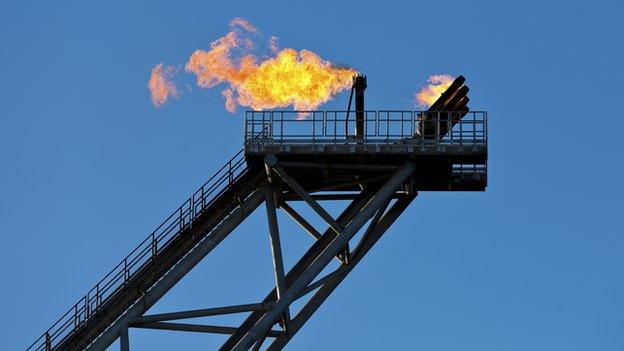
- Published13 January 2015
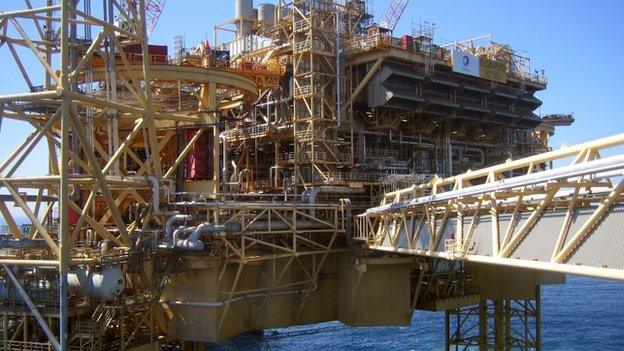
- Published12 January 2015
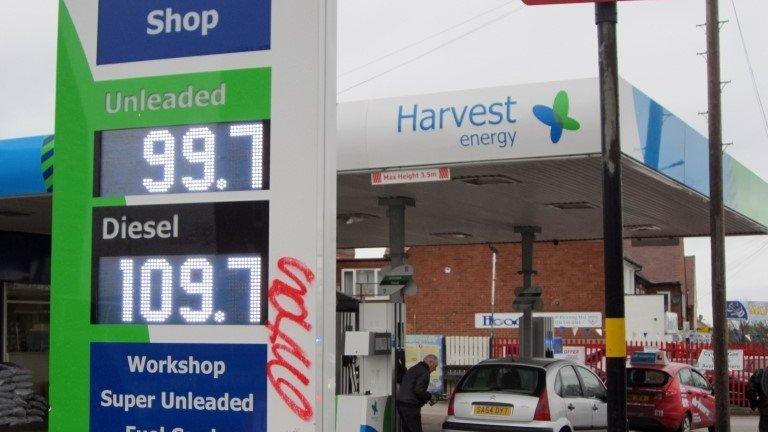
- Published8 January 2015
- Published7 January 2015
